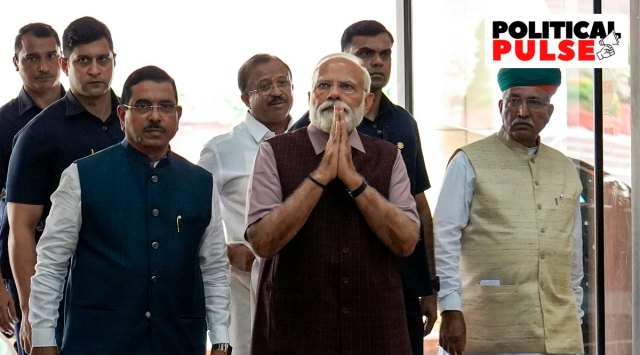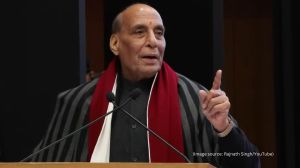The attention now has moved to the crux of the arguments the two sides will put up to build their case, given the Opposition pushback on the Manipur issue and the PM refusal to bow to its demands to speak on it in Parliament.

BJP sources said the party is readying data that will highlight the long history of trouble in the Northeast, for most part of which the Congress controlled the region. The Opposition sees it as probably the last chance for it to “expose the fallacy” of the Modi government’s double-engine government argument, ahead of key state elections and 2024 Lok Sabha polls.
With numbers already stacked heavily in its favour, the BJP got a further boost Tuesday when the BJD announced that it would support the government on the motion. Earlier, the YSRCP – which like the BJD is not aligned with either the NDA or the INDIA bloc – had announced that it would vote against the motion.
While the majority mark to win or defeat the motion is 272, the NDA government has 331 MPs on its side, including 303 of its own. Add to that the YSRCP’s 22 and the BJD’s 12 MPs.
Hence it all comes down to who scores more political points in the debate which, coming in the wake of a turbulent House session, is expected to be stormy. On Tuesday too, the INDIA bloc parties walked out of a Business Advisory Committee meeting demanding that the no-confidence debate be taken up on priority.
The parties which have said they will vote against the government on the motion include the INDIA bloc and the Bharat Rashtra Samithi. They demanded on Tuesday that the government not push through its legislative agenda while the no-confidence motion is pending. “We wanted the no-confidence motion taken up tomorrow itself,” Congress whip in the Lok Sabha Manickam Tagore said.
Story continues below this ad
ExplainedThe stakes
THE BJP is readying data to highlight the long history of trouble in the Northeast, for most part of which Congress was in power. For Oppo-sition, it is a chance to “expose the fallacy” of the BJP’s double-engine government claim.
The government has maintained that there are no rules or precedents regarding this, and that the Speaker has 10 days to schedule a debate after the motion has been admitted.
The two Houses of Parliament have been stalled continuously since the Monsoon Session began on July 20, with the Opposition demanding that PM Modi first make a statement on the Manipur situation on the floor of the House. The no-confidence motion is a means to get the PM to speak, they argue.
The BJP has questioned the Opposition’s insistence on a Modi statement, and said it was ready for a discussion with Home Minister Amit Shah replying. It is the Opposition that is shying away from a debate, it says.
On Monday, Leader of the Rajya Sabha Piyush Goyal said: “It could be because of the fear that the debate could go into some dark (truths) of theirs, or reveal positive changes brought by the NDA government in the Northeast… Anyway, it is clear that they are running away from a discussion.”
Story continues below this ad
The BJP does not see any reason to feel worried, with or without the no-confidence motion. As the impasse stretches on, the Opposition unity has shown signs of fraying, even as the government has managed to get its key Bills passed without much pushback.
BJP leaders also hark to the no-confidence motion debate in the Lok Sabha in 2018, where Modi in his reply launched a no-holds-barred attack on the Congress. It set the pitch for the 2019 Lok Sabha elections that followed, a senior BJP leader said, adding: “Our speakers will ensure this time too that the Opposition regrets its decision to go in for a no-trust motion.”
Accepting the Lokmanya Tilak National Award in Pune Tuesday, PM Modi dropped pointers of the same, talking of a “trust surplus” now in policies and hard work of the people, compared to a “trust deficit” earlier.

































